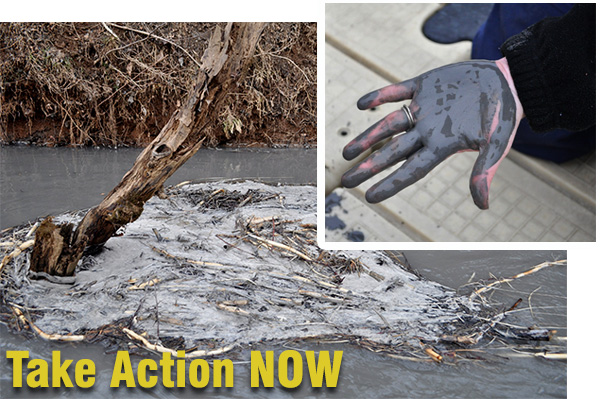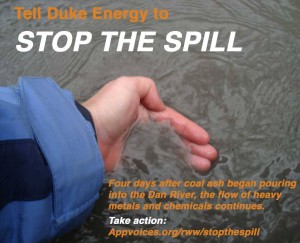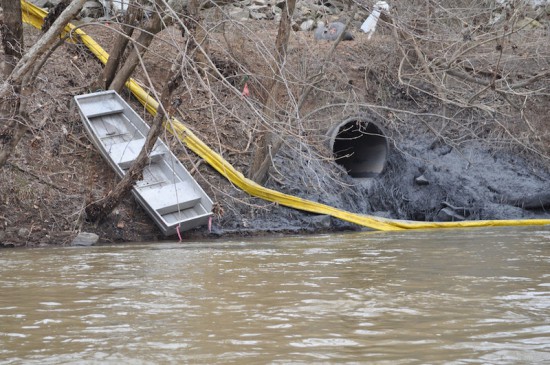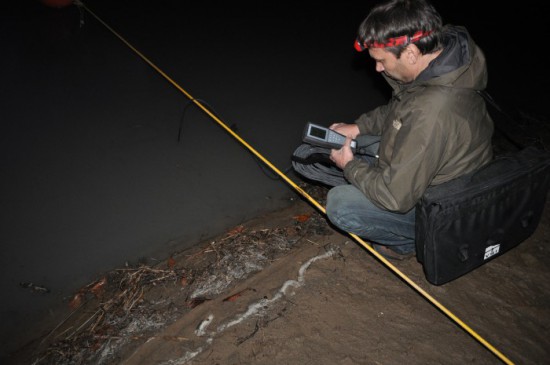Update: Federal Criminal Investigation of NC Department of Environment and Natural Resources Following Dan River Spill
Posted
by editor | February 7, 2014 at
11:00 am
The N.C. Department of Environment and Natural Resources is the target of a federal criminal investigation following Duke Energy’s coal ash spill into the Dan River on February 2.
Take action now to tell Congress and the EPA that coal ash must be regulated as the toxic substance that it is.
———————————————————————
Updated Feb. 13, 11:00 a.m.
———————————————————————

The EPA has agreed to release new rules for the disposal of toxic coal ash waste by the end of this year, but some folks in Congress are pushing to block the agency from finalizing these rules and regulating toxic coal ash. But that can’t happen if we are to keep our water safe. Contact your Senators and the EPA TODAY and ask them to defend clean water from toxic coal ash pollution!

Going back on its initial findings, DENR says samples
taken near the site of the Dan River coal ash spill show arsenic levels four
times higher than the state human health standard.


A ruptured storm water pipe was quickly identified as
the source of the coal ash polluting the Dan River. But so far, there has been
no solution to completely stop coal ash from reaching the river.

Appalachian Voices’ Matt Wasson tests water from the
Dan River near the site of a coal ash spill. Photo by Eric Chance (View more photos)
Updated Feb. 13, 1:30 p.m.
The N.C. Department of Environment and Natural Resources is the target of a federal criminal investigation following Duke Energy’s coal ash spill into the Dan River on February 2.
The U.S. Attorney’s office issued a grand jury subpoena requesting records from DENR related to coal ash discharges from the Dan River Power Plant including emails, memos and reports from 2010 to the present. Duke Energy confirmed to WRAL that it also received a subpoena, but the company is not required to disclose the contents of the subpoena.
Though this is shocking news, it’s not surprising considering DENR’s delayed response to the spill and the report last Friday showing that the agency assured the public for five days that arsenic levels in the Dan River were within safe human health standards, when in fact DENR’s own test results clearly showed arsenic levels were four times higher on the Monday and Tuesday following the spill.
Gov. Pat McCrory, who worked for Duke Energy for 28 years and received considerable campaign contributions from the company, told business leaders this year, his top priority is making environmental regulations more business friendly. McCrory appointed John Skvarla to head DENR. Since accepting that position, Skvarla has changed DENR’s mission statement to move the agency away from being “a bureaucratic obstacle of resistance” and toward becoming “a customer-friendly juggernaut.”
According to Amy Adams, a 9-year veteran of DENR who is now Appalachian Voices’ N.C. campaign coordinator, the customers of the agency are no longer North Carolinians or the state’s natural resources, but industry. Read her editorial about the “soul-crushing” takeover of DENR here.
If the agency entrusted with protecting North Carolina’s citizens and natural resources from pollution continues to pander to business interests rather than taking action to prevent environmental disasters, North Carolinians may have to endure more spills like the one that sullied the Dan River.
Take action now to tell Congress and the EPA that coal ash must be regulated as the toxic substance that it is.
———————————————————————
Updated Feb. 13, 11:00 a.m.
The N.C. Department of Health issued an advisory on Wednesday, warning citizens not to touch the Dan River, which was contaminated with coal ash 10 days ago after a storm water pipe broke at Duke Energy’s retired plant in Eden, N.C. The Department of Health also advised residents not to eat fish or mussels from the river.
Duke still has not come out with a cleanup plan for the spill, which has left parts of the Dan River unsafe for recreational use, including swimming and fishing.
This is not the first time that coal ash from a Duke Energy power plant has caused serious damage to North Carolina’s fishing stock. A study conducted last November by Dr. Dennis Lemly, a research biologist at Wake Forest University, showed that fish populations in Lake Sutton, outside of Wilmington, N.C, were suffering as a result of selenium poisoning from coal ash discharges by Duke Energy’s Sutton Power Plant. The study estimated that 900,000 fish were dying each year from selenium poisoning. Lake Sutton is still zoned as a fishery.
Duke Energy’s coal ash ponds are a danger to human health, drinking water, and the precious rivers and lakes North Carolinians use for boating, swimming, and fishing. How many rivers and lakes must we lose before this company properly handles its pollution? It’s time for Duke to stop putting our waterways at risk and clean up their coal ash once and for all! Take action here.
———————————————————————

The EPA has agreed to release new rules for the disposal of toxic coal ash waste by the end of this year, but some folks in Congress are pushing to block the agency from finalizing these rules and regulating toxic coal ash. But that can’t happen if we are to keep our water safe. Contact your Senators and the EPA TODAY and ask them to defend clean water from toxic coal ash pollution!
———————————————————————-

Going back on its initial findings, DENR says samples
taken near the site of the Dan River coal ash spill show arsenic levels four
times higher than the state human health standard.
Updated Feb. 10, 12:45 p.m.
The N.C. Department of Environment and Natural Resources reported Friday afternoon that their tests from Monday and Tuesday of last week, the days following the Dan River coal ash spill, showed arsenic levels in the Dan River four times higher than the state water quality standards.
This is big news. For five days, the water reports from NC DENR said that arsenic levels were below drinking water standards when they were actually four times greater. Arsenic is a poison that can cause cancer and even death when consumed in high doses or over long periods of time.
An NC DENR employee claims to have accidentally compared the sample results with arsenic standards for aquatic life instead of human drinking water standards. They changed the report on Friday without alerting the public of the mistake. Read more here.
The City of Danville’s water intake is just 20 miles downstream from the spill, but Danville city officials maintain that treated water at the plant did not exceed the arsenic limit on Tuesday.
The EPA will release it’s test results soon. See a map of their sample sites here. A map of sites we tested can be found here.
Coal ash ponds across the state contain arsenic that leaches into groundwater, posing a risk for neighboring communities who drink, bathe, and cook with water containing elevated levels of arsenic, heavy metals, and other toxic chemicals.
Water samples from the recent coal ash spill illustrate that coal ash contains hazardous toxins that have the potential to poison North Carolinians’ drinking water. Tell Duke Energy it’s time to clean up their coal ash and stop putting our water at risk.
- – - – - – - – - – - – - – - – - – - – - – - – - – - – - -

Updated Feb. 7, 5:00 p.m.
It’s been five days since the massive coal ash spill at Duke Energy’s plant on the Dan River, and Duke still has not stopped the flow of coal ash, though it has diminished considerably.
The N.C. Department of Environment and Natural Resources and the Waterkeeper Alliance released the results from their water testing yesterday. Read NC DENR’s results here.
Today, Appalachian Voices released our own water testing results which show values for several contaminants that exceed federal drinking water standards. For example, the arsenic level at the spill site was 95.1 parts per billion, nine and a half times the recommended drinking water standard. Downstream samples also exceeded the federal recommended drinking water and freshwater standards for aluminum, iron, manganese and lead. Read our full results here.
These results show that the Dan River has been negatively affected by the spill, but there is much more testing that needs to be done, since there are numerous, potentially harmful pollutants that have not been tested for, such as polycyclic aromatic hydrocarbons and volatile organic compounds.
The water quality results from different organizations vary, however, this is due to the method of sampling. Appalachian Voices and the Waterkeeper Alliance chose to test unfiltered water because this better demonstrates the effects on aquatic life in the river. NC DENR chose to filter their water samples, which removes coal ash sediments. This is an accurate way to test the safety of drinking water, which is being filtered at the Danville, Va., water treatment facility.
The results of these tests should be a wake up call. The spill in Eden, N.C., is an example of the threat coal ash ponds across the state pose. Tell Duke that it is time to protect our water resources from the dangers of coal ash once and for all.
- – - – - – - – - – - – - – - – - – - – - – - – - – - -
Updated Feb. 6, 1:00 p.m.
Four days after the Dan River coal ash spill, Duke Energy still has not successfully stopped the flow of heavy metals, polluted water, and chemicals into the Dan River. Take action by clicking here or on the image above to send a letter to Duke Energy telling them enough is enough, it’s time to clean up the coal ash threatening North Carolina’s waters.
- – - – - – - – - – - – - – - – - – - – - – - – - – - -

A ruptured storm water pipe was quickly identified as
the source of the coal ash polluting the Dan River. But so far, there has been
no solution to completely stop coal ash from reaching the river.
Update Feb. 5, 5:00 p.m.
Since Monday night, Appalachian Voices has been on the scene of the massive coal ash spill that originated at Duke Energy’s retired Dan River Steam Station and continues to pollute the Dan River.
At the site of the spill and for several miles downstream, our water quality specialists have been collecting water samples and documenting the spill. Check out our Flickr for the most recent images. Greenpeace has also captured amazing aerial views of the spill, available on their Flickr.
In addition to documenting the spill, Appalachian Voices’ North Carolina campaign coordinator, Amy Adams, and Director of Programs Matt Wasson have been speaking with reporters to ensure that citizens are informed of the spill and continue to receive accurate information.
Check out some of the stories here, here, and here.
The N.C. Department of Environment and Natural Resources states that the water in the Dan River is “NOT safe” and that they will receive lab results for heavy metals tomorrow.
The city of Danville, Va., says that their water treatment facility has been able to treat the coal ash contamination thus far, and that the water coming from their facility is safe to drink. But further downstream, officials in Virginia Beach halted water intakes on Lake Gaston, a reservoir linked the Dan River Basin, to assure residents their drinking water would not be contaminated by the spill.
More than 73 hours later, Duke Energy still has not successfully stopped the flow of coal ash coming from the ruptured storm water pipe that runs under the pond.
- – - – - – -

Appalachian Voices’ Matt Wasson tests water from the
Dan River near the site of a coal ash spill. Photo by Eric Chance (View more photos)
Since Sunday night, coal ash has been spilling into the Dan River from a coal ash pond at Duke Energy’s retired Dan River Steam Station in Eden, N.C. The spill began when a storm water pipe under one of the plant’s coal ash pond burst, causing solid coal waste and toxic water held in the basin to flow through the pipe into the river.
Duke estimates that up to 27 million gallons of water from the basin and as much as 82,000 tons of solid ash have entered the river. But the company still has not successfully stopped the flow, according to Duke spokeswoman Erin Culbert.
Duke did not publicly report the spill until after 4 P.M. on Monday evening, though it was first noticed by a security guard who saw that the water level in the ash pond was lower than usual around 2 P.M. on Sunday.
Throughout the day, residents saw the Dan River changing colors and ash washing up on the river banks. Duke has not released any water testing results, despite the high levels of toxic chemicals, including arsenic, selenium, mercury, lead, and boron, present in coal ash. The drinking water source for Danville, Va., is located just twenty miles downstream from the breach.
Appalachian Voices water quality specialists traveled to Eden, N.C., last night to sample the cloudy river and document the spill. “It’s pretty clear that there is a lot of ash that has already migrated,” says Matt Wasson of Appalachian Voices, “the water is very gray and the sediment has coal ash in it. Already, the spill has clearly traveled to Danville.”
Although Duke claims that the dam itself, which is holding back 27 acres of coal ash, remains secure, they also report that erosion has occurred on one side of the dam. The ash basin is rated “high hazard” by the EPA meaning that dam failure would likely cause serious property damage and human death.
“This is the latest, loudest alarm bell yet that Duke should not be storing coal ash in antiquated pits near our state’s waterways,” says Frank Holleman, an attorney for the Southern Environmental Law Center.
Duke is currently being sued by the state for unpermitted coal ash discharges at all 14 of its coal-fired power plants. Although seven of the plants are retired, the coal ash remains on site, posing a serious danger to neighboring residents and North Carolina’s surface and groundwaters.
There are 27 coal ash ponds in the state, many of which are just as likely as the Dan River pond to breach and cause serious damage and loss of human life. Even when coal ash is properly contained, the EPA reports that residents living near coal ash ponds are 9 times more likely to develop cancer than someone who smokes a pack of cigarettes a day.
This spill comes only four months after coal ash from Duke’s Sutton Power Plant contaminated the groundwater of a community near Wilmington, N.C., forcing residents to switch to another drinking water source.
Duke Energy claims that they are “committed to closing ash basins in a way that protects groundwater long-term and is prudent for customers and neighbors” and yet all of their coal ash ponds are currently leaking into ground and surface waters.
This is not the first time that coal ash has spilled into waterways, but it’s time for Duke Energy to do its part to make it the last.
Visit Appalachian Voices’ Red, White, and Water page to learn more about our work to pressure Duke Energy and other coal-burning utilities to clean up properly store coal ash in dry, lined pits away from precious water resources.
Soul-crushing takeover of NC DENR brings resignation
December 15, 2013
I never planned to leave state government. I loved my job at the N.C. Department of Environment and Natural Resources.
It was in my DNA, quite literally. Both my parents were lifelong state employees, and I was the second-generation DENR employee in my family.
My parents instilled in me a love of nature. My father was a nautical man and took us sailing often.
My mother hails from western North Carolina, where we explored nearly every ridge and hollow along the Blue Ridge.
They also instilled in me a strong motivation to enter public service. Dedicating my career to the agency charged with protecting my home state’s water, air and land for the public interest was a no-brainer.
Unfortunately, so was quitting the agency this fall.
For years, DENR has been stretched thin, its programs underfunded and its staff overworked, yet we managed to adhere to our core mission and to the personal dedication that drives many of us who work in state government.
But this year’s historic and hostile takeover of DENR by politically and ideologically motivated lawmakers in the General Assembly was soul-crushing. I could no longer clock in in good conscience and believe I could uphold my commitment to protect the environment.
Environmental regulators play an important role and have a huge responsibility.
They must issue permits for industrial activities in a way that protects natural resources. They must ensure the state meets a variety of federal requirements.
And at all times, they must balance assisting individual residents, protecting the public resource and holding polluters accountable.
These are not just empty bureaucratic exercises.
What’s at stake is nothing less than having clean water to drink, healthy streams in which to fish and swim, pure air to breathe and green space where wildlife can thrive and where our children can play.
The General Assembly’s legislation reorganizing DENR results in deep cuts to staff and resources.
The Division of Water Quality staff, for example, will likely be 24 percent smaller by March than it was in early 2011. “Do more with less” has become the mantra of upper management, but we in the ranks heard the message loud and clear: “Do less. Period.”
There are simply too few employees with too much territory to cover, and the repercussions are real.
Staff are increasingly tasked with duties for which they have no previous experience, such as reviewing complex technical pollution-control permit applications.
Because state law requires DENR to issue permits within a tight deadline, staffers are under great pressure to essentially trust the industry’s word that everything is in order. (The phrase “a fox guarding the hen house” comes to mind.)
I did not sign on to my DENR job to wield a rubber stamp.
A permit is only as good as the enforcement behind it, but under such conditions, on-site inspections and compliance monitoring – not required by law – inevitably will go by the wayside. Even before the budget cuts, the water division was spread thin trying to do inspections on thousands of permits.
If and when violations are found, I fear that DENR’s new management will downplay or even overlook them.
Most important in my book, staff members will not be as available to the public as in years past.
Although customer service is a rallying cry of the current leadership, it seems that businesses and industry are considered the only “customers.”
As DENR Sec. John Skvarla told business leaders this year, his top priority is making environmental regulations more business friendly.
I had planned to spend my career at DENR and would have encouraged my children to consider public service as well.
After the changes this year, and after much soul-searching, I decided to leave DENR, but not abandon it.
My aim is to fight for the agency, for all the honest and dedicated employees under siege by the current administration and private interests vying for deregulation and personal gain.
And to fight for every North Carolina resident who values our state’s amazing natural resources and wants them safeguarded for generations to come.
Amy Adams is North Carolina Campaign Coordinator for the Boone-based Appalachian Voices, a nonprofit that helps give voice to people who care about our natural heritage.
My parents instilled in me a love of nature. My father was a nautical man and took us sailing often.
My mother hails from western North Carolina, where we explored nearly every ridge and hollow along the Blue Ridge.
They also instilled in me a strong motivation to enter public service. Dedicating my career to the agency charged with protecting my home state’s water, air and land for the public interest was a no-brainer.
Unfortunately, so was quitting the agency this fall.
For years, DENR has been stretched thin, its programs underfunded and its staff overworked, yet we managed to adhere to our core mission and to the personal dedication that drives many of us who work in state government.
But this year’s historic and hostile takeover of DENR by politically and ideologically motivated lawmakers in the General Assembly was soul-crushing. I could no longer clock in in good conscience and believe I could uphold my commitment to protect the environment.
Environmental regulators play an important role and have a huge responsibility.
They must issue permits for industrial activities in a way that protects natural resources. They must ensure the state meets a variety of federal requirements.
And at all times, they must balance assisting individual residents, protecting the public resource and holding polluters accountable.
These are not just empty bureaucratic exercises.
What’s at stake is nothing less than having clean water to drink, healthy streams in which to fish and swim, pure air to breathe and green space where wildlife can thrive and where our children can play.
The General Assembly’s legislation reorganizing DENR results in deep cuts to staff and resources.
The Division of Water Quality staff, for example, will likely be 24 percent smaller by March than it was in early 2011. “Do more with less” has become the mantra of upper management, but we in the ranks heard the message loud and clear: “Do less. Period.”
There are simply too few employees with too much territory to cover, and the repercussions are real.
Staff are increasingly tasked with duties for which they have no previous experience, such as reviewing complex technical pollution-control permit applications.
Because state law requires DENR to issue permits within a tight deadline, staffers are under great pressure to essentially trust the industry’s word that everything is in order. (The phrase “a fox guarding the hen house” comes to mind.)
I did not sign on to my DENR job to wield a rubber stamp.
A permit is only as good as the enforcement behind it, but under such conditions, on-site inspections and compliance monitoring – not required by law – inevitably will go by the wayside. Even before the budget cuts, the water division was spread thin trying to do inspections on thousands of permits.
If and when violations are found, I fear that DENR’s new management will downplay or even overlook them.
Most important in my book, staff members will not be as available to the public as in years past.
Although customer service is a rallying cry of the current leadership, it seems that businesses and industry are considered the only “customers.”
As DENR Sec. John Skvarla told business leaders this year, his top priority is making environmental regulations more business friendly.
I had planned to spend my career at DENR and would have encouraged my children to consider public service as well.
After the changes this year, and after much soul-searching, I decided to leave DENR, but not abandon it.
My aim is to fight for the agency, for all the honest and dedicated employees under siege by the current administration and private interests vying for deregulation and personal gain.
And to fight for every North Carolina resident who values our state’s amazing natural resources and wants them safeguarded for generations to come.
Amy Adams is North Carolina Campaign Coordinator for the Boone-based Appalachian Voices, a nonprofit that helps give voice to people who care about our natural heritage.



